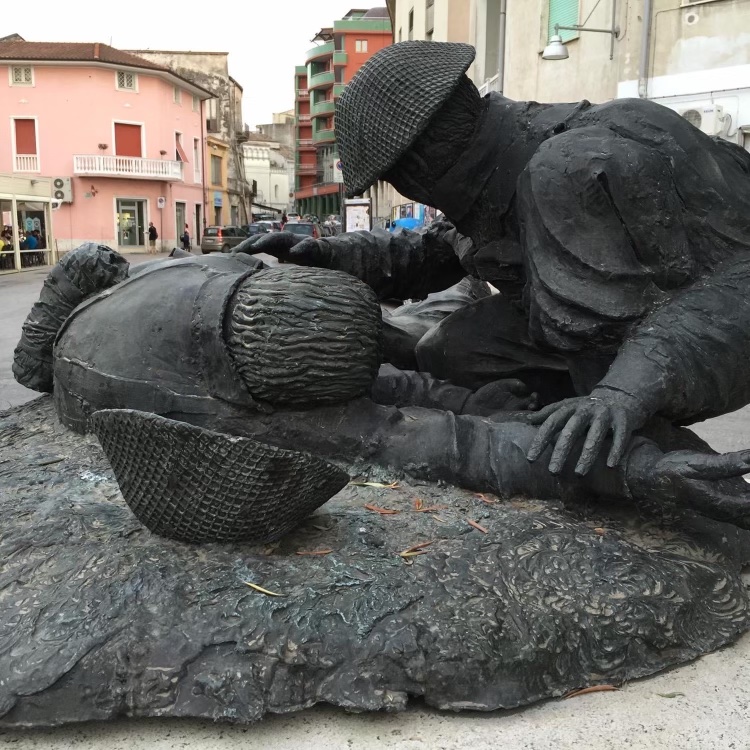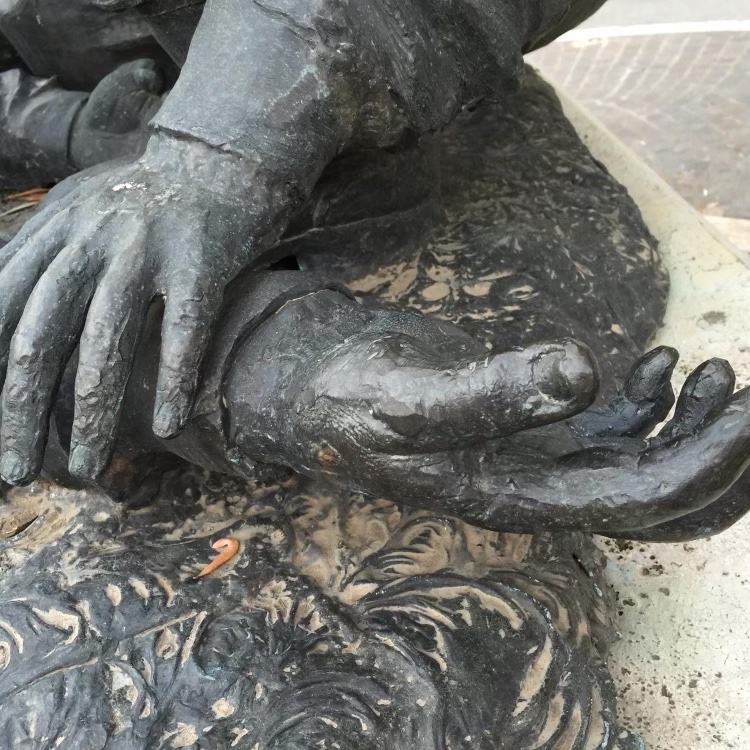
They say Canadians are peace-loving people. I count myself among many Canadians whose personality style wants to avoid conflict. We would rather ‘go along to get along’ than engage in conflict.
That is why this Gospel text is troubling, to say the least.[1] It is rife with conflict, and not just in the public arena. Jesus suggests that conflict is a normal part of a faithful life, even within a family. That part, especially, I don’t like.
How do we receive this message which, I would like to presume, promises something healthy, hopeful and positive for the journey of faith?
Jesus says, “What I say to you in the dark, tell in the light; what you hear whispered, proclaim from the housetops.”[2]
Perhaps there is something that we don’t see amidst all the froth and flotsam of human conflict. Perhaps we may not appreciate it right away— something deeper, a connection between us all that runs true despite the surface turbulence of human interaction.
Maybe amidst the strife, the divisions and disagreements there lies a hidden reality that is very much worth “proclaiming from the housetops.” And we need to tap in on that bond, become aware of it, draw deeply from its power, especially when we disagree.
What is this bond?
When infants are baptized, we say that even though the individual baby cannot express cognition in the way adults do and therefore can’t say with words, “I believe”, it is the prayers of the faithful, the community, that validate the affirmation of faith at baptism. And their faith stands in for the infant. When the baby can’t, the grown-ups will.
During the early stages of the pandemic debate swirled around Eucharistic practice—whether it can be conveyed online or only in person. I was struck by the comment of a faithful pastor now retired, who said that while he individually didn’t attend in person to receive the sacrament, his faith was nonetheless encouraged simply to know that somewhere, in some place, the Holy Communion was happening “where two or three are gathered”. Somewhere, someone was.
Over the last couple of months I’ve helped start up noon hour meditation groups for staff at the Bruyère hospitals here in Ottawa. Last week some of the organizers and chaplains debriefed how it was going so far. During the meeting over zoom much was said about who was not attending. We reflected on the meaning of relationships and community.
And the conversation became more open-ended. One chaplain, a Christian, remarked that while she hadn’t worshiped on Sundays in a local church for a long time, her faith was encouraged nevertheless to know that somewhere, someone, was going to church every Sunday. It was important to her, never mind that she wasn’t attending, that it was happening somewhere.
Those of you who are here in person need to hear this: That knowledge alone has kept her faith going. A faith that is alive.
The prayers continue despite what individuals do or don’t do at any given time. Especially in grief, when God may feel distant; or, dealing with a personal tragedy; or, reeling from an accident or circumstance beyond your control that has disrupted your life– when you don’t feel like or can’t pray … perhaps it’s at those moments you need to know that someone, somewhere, is praying for you.
“This is my prayer to you, at the time you have set, O Lord.”[3]
The discipline of regular prayers, whether it be every Sunday morning in worship, or any other set pattern that people know, is a gift amidst the turmoil of life. And even if an individual in a unique situation cannot or does not participate in person, their physical absence doesn’t invalidate the prayer. In truth, the prayers of the community can encourage those very people.
In the Psalm for today (69:13), the Psalmist acknowledges “the time set” for prayers. For Christians, as for people of other religions, times set for prayer function as an anchor point in the day, the week, and the year.
When I took a world religion’s class in high school, I recall asking why Muslims prayed at five set times every day? The answer I received inspired me and expanded my understanding of the power of prayer. They followed that regimen of prayer so that people of the Islamic faith would know that prayers were always happening, given the various time zones, around the globe. That awareness can be very encouraging for faith. Even though individually I may not be saying any prayers right now, someone, somewhere, is.
When Luke describes the lifestyle of early Christians in the Acts of the Apostles, the early disciples made “the prayers”[4] part of each day. He doesn’t imply, “they prayed whenever and whatever.” He refers to “the” prayers–a definite article, and order of prayer implied. They observed common prayers at the times set aside. It was a discipline.
Whether it be Muslims praying five times a day or Christians following the Daily Office, called the “Hours” (for example: matins, vespers, compline, etc.) or meditating twice daily in the morning and in the evening, people of faith in their practice of prayer attest to the unceasing[5] nature of prayer, collectively. Prayer continues, around the globe at all times. Even if individuals aren’t praying unceasingly, the community is.
What we can’t do by ourselves, someone, somewhere, is. American writer Helen Keller wrote, “Alone we can do so little; together we can do so much.” And that goes for prayer—how we connect with God, with ourselves and with one another.
And I wonder, amidst all the turbulence of life in community, is it this awareness of what unites us, what gives us power from deep within, that releases us to do so much for God. And even though our faithful actions might result in ruffling some feathers? So be it.
I heard the story from the son of the late Art Sugden, who fought in the First World War as part of the 31st Alberta Battalion in the Canadian Corps. Ted told me of his father’s dramatic survival of the battle at Vimy Ridge.[6]
A bullet from tracer fire took out both his eyes, rendering him blind for the rest of his life.
Eventually Art returned to his hometown Calgary in 1929. He also returned to his favourite hobby: gardening. Though he was physically blind and couldn’t see the beauty of the flowers he tended, he kept on working in his garden. Though I suspect his other senses could enjoy the flowers’ gift, he couldn’t see for himself their blooms. Yet he continued during the Springtime, Summertime and Fall time of the year, caring for the earth and flowers that grew there. He did this work faithfully even though he couldn’t witness with his own eyes the fruit of his labour.
But he kept on, trusting that the flowers he tended would give the world a beautiful gift of vibrant colour and joy. And he was right. Others saw, saw the gift he nurtured and brought to life, saw the beauty that in turn gave the world joy and hope for tomorrow.
Somewhere, someone is.
[1] Matthew 10:24-39
[2] Matthew 10:27
[3] Psalm 69:13
[4] Acts 2:42
[5] 1 Thessalonians 5:17
[6] Edward Sugden, “A tribute to my father” in Esprit de Corps (Volume 16, Issue 10, November 2009), p.36-38.




